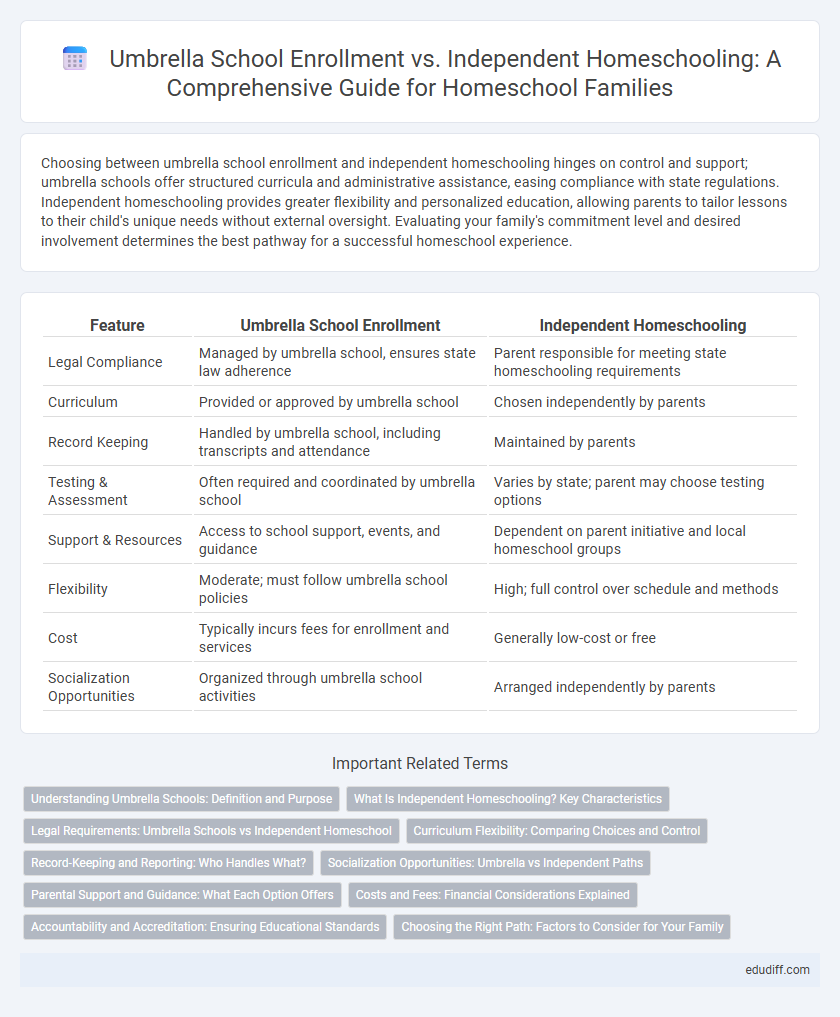Choosing between umbrella school enrollment and independent homeschooling hinges on control and support; umbrella schools offer structured curricula and administrative assistance, easing compliance with state regulations. Independent homeschooling provides greater flexibility and personalized education, allowing parents to tailor lessons to their child's unique needs without external oversight. Evaluating your family's commitment level and desired involvement determines the best pathway for a successful homeschool experience.
Table of Comparison
| Feature | Umbrella School Enrollment | Independent Homeschooling |
|---|---|---|
| Legal Compliance | Managed by umbrella school, ensures state law adherence | Parent responsible for meeting state homeschooling requirements |
| Curriculum | Provided or approved by umbrella school | Chosen independently by parents |
| Record Keeping | Handled by umbrella school, including transcripts and attendance | Maintained by parents |
| Testing & Assessment | Often required and coordinated by umbrella school | Varies by state; parent may choose testing options |
| Support & Resources | Access to school support, events, and guidance | Dependent on parent initiative and local homeschool groups |
| Flexibility | Moderate; must follow umbrella school policies | High; full control over schedule and methods |
| Cost | Typically incurs fees for enrollment and services | Generally low-cost or free |
| Socialization Opportunities | Organized through umbrella school activities | Arranged independently by parents |
Understanding Umbrella Schools: Definition and Purpose
Umbrella schools are legal entities that provide administrative support and oversight for homeschooling families, ensuring compliance with state education regulations. They often offer a structured curriculum, standardized testing, and record-keeping services while allowing parents to maintain instructional control. These schools serve as a bridge between independent homeschooling and public education, giving families the flexibility of home instruction paired with official enrollment benefits.
What Is Independent Homeschooling? Key Characteristics
Independent homeschooling is a flexible education method where parents or guardians assume full responsibility for designing and implementing their child's curriculum without adherence to an umbrella school's guidelines. Key characteristics include complete control over instructional materials, personalized pacing, and tailored learning environments that reflect the child's unique interests and learning styles. Families maintain direct compliance with state homeschooling laws, ensuring individualized education without oversight from external educational institutions.
Legal Requirements: Umbrella Schools vs Independent Homeschool
Umbrella school enrollment offers a structured approach to homeschooling by complying with state educational laws through an overseeing institution, often easing legal documentation and reporting requirements for parents. Independent homeschooling requires parents to personally meet state-specific regulations, such as submitting notices of intent, maintaining attendance records, and administering assessments, which vary widely by jurisdiction. Understanding these legal frameworks ensures compliance and safeguards educational rights within both umbrella school and independent homeschool settings.
Curriculum Flexibility: Comparing Choices and Control
Umbrella school enrollment provides structured curriculum options often aligned with state requirements, offering less flexibility but more guidance and support for families. Independent homeschooling allows parents complete control over curriculum choices, enabling tailored educational experiences that meet unique student needs and learning styles. Families must weigh the trade-off between curriculum flexibility and the level of oversight or resources provided when selecting between these homeschooling paths.
Record-Keeping and Reporting: Who Handles What?
Umbrella school enrollment typically involves the umbrella organization managing record-keeping and reporting responsibilities, ensuring compliance with state education regulations and submitting necessary documentation on behalf of the student. In contrast, independent homeschooling requires parents to maintain accurate records of attendance, coursework, and assessments, along with submitting mandated reports directly to local education authorities. Understanding these distinctions helps families choose the best homeschooling structure aligned with their administrative preferences and state requirements.
Socialization Opportunities: Umbrella vs Independent Paths
Umbrella school enrollment offers structured socialization opportunities through organized classes, group activities, and extracurricular events that connect students with peers in similar educational environments. Independent homeschooling relies heavily on parental initiative to create social experiences through co-ops, community groups, or sports, often requiring more effort to ensure consistent peer interaction. Both paths provide socialization but differ significantly in the ease and frequency of accessible group engagement.
Parental Support and Guidance: What Each Option Offers
Umbrella school enrollment provides structured parental support and guidance through access to curriculum resources, teacher assistance, and administrative oversight, ensuring compliance with state education requirements. Independent homeschooling offers parents complete control and flexibility in designing lesson plans and teaching methods, but requires significant self-motivation and research to meet educational standards. Both options aim to support parents but differ in the level of external assistance and regulatory structure provided.
Costs and Fees: Financial Considerations Explained
Umbrella school enrollment typically involves monthly fees ranging from $50 to $200, covering curriculum access, record-keeping, and state compliance, whereas independent homeschooling incurs variable costs primarily for materials and extracurricular activities. Families choosing umbrella schools benefit from streamlined administrative support but must budget for ongoing service charges. Independent homeschoolers enjoy cost flexibility but assume full responsibility for expenses related to curriculum, resources, and state-mandated testing or reporting.
Accountability and Accreditation: Ensuring Educational Standards
Umbrella school enrollment provides structured accountability through regular progress reports, standardized testing, and teacher oversight, ensuring educational standards align with state requirements. Independent homeschooling requires parents to personally maintain records, create curricula, and often comply with less stringent or varied state regulations, which can affect consistent accreditation. Choosing between these options depends on the family's ability to meet accountability measures while prioritizing recognized academic standards and potential credit transfers.
Choosing the Right Path: Factors to Consider for Your Family
Choosing between umbrella school enrollment and independent homeschooling hinges on factors like state regulations, desired curriculum flexibility, and access to support resources. Umbrella schools often provide structured guidance, standardized testing, and socialization opportunities, which benefit families seeking external validation and community. Independent homeschooling allows for complete curriculum customization and scheduling freedom, ideal for families prioritizing individualized education and autonomy.
Umbrella School Enrollment vs Independent Homeschooling Infographic

 edudiff.com
edudiff.com